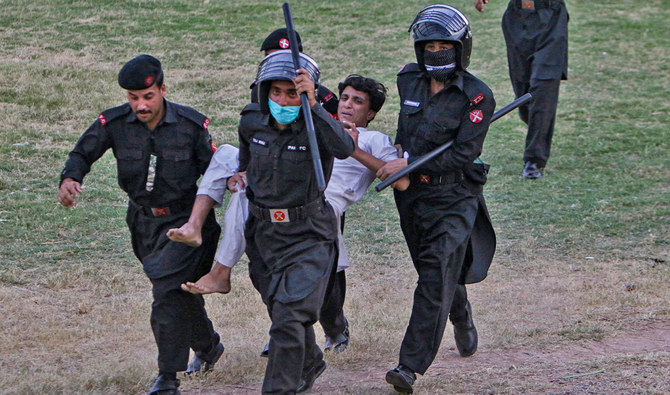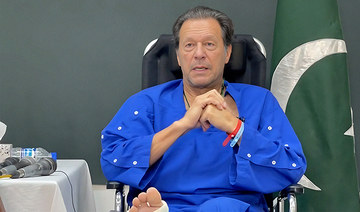ISLAMABAD: The Islamabad police on Monday warned of action against the ones staging protest in Islamabad without prior permission, after an aide to former prime minister Imran Khan said their party would start blocking entry and exit points of Islamabad from Monday night as it plans to resume its anti-government long march to the Pakistani capital.
Khan said on Sunday that his protest march toward the capital, which was suspended after he was wounded in an apparent attempt on his life, would resume Tuesday.
Sitting in a wheelchair, his right leg bandaged and elevated, Khan spoke from the Shaukat Khanum hospital, where he was admitted Thursday after he received bullet wounds to his right leg. The former premier was discharged from the hospital Sunday evening.
Khan’s Pakistan Tehreek-e-Insaf (PTI) party has announced resuming the long march from the same spot in Wazirabad city, where Khan came under attack last week, but the Islamabad police have warned political activists and people against staging a demonstration in the capital without permission.
“The Islamabad Capital Police is trying to arrest the political workers who have been identified and have cases registered [against them],” the Islamabad police said on Twitter.
“All political people are requested to protest at the designated place with the permission of the administration.”
It said the way leading to the airport would remain open for the sake of domestic and international guests as it was vital to the country’s image, requesting people to cooperate with the law enforcers.
Pervez Khattak, a Khan aide, earlier told a private news channel their party would start blocking entry and exit points of Islamabad Monday night.
“Workers of the Pakistan Tehreek-e-Insaf will block entry and exit points of Islamabad from tonight,” Pakistan’s Geo News channel quoted Khattak as saying.
“All the long march caravans will reach Rawalpindi in 11-14 days. Imran Khan will lead the long march from Rawalpindi to Islamabad.”
The government earlier said it would allow and provide security for the PTI gathering in Islamabad at a place designated by courts, but would not let the marchers enter the Red Zone, which houses important buildings like parliament and the Supreme Court.
Announcing resumption of his march, Khan repeated his demand for the resignation of three powerful government and military figures, whom he has accused of plotting the attack on him.
The three figures are PM Shehbaz Sharif, Interior Minister Rana Sanaullah and Maj. Gen. Faisal Naseer, who is the counterintelligence chief of Pakistan’s Inter-Services Intelligence (ISI) agency.
Khan has offered no evidence to support his allegations, which were rejected by the Sharif’s government and the military spokesman said the allegations were not true.
Khan was ousted from office in April in a no-confidence vote in parliament. He organized the march on Islamabad to pressure Sharif’s government into announcing early elections but Sharif says elections will take place as scheduled, in 2023.
Khan’s protest march, which started Oct. 28, was peaceful until Thursday’s attack. The shooting has raised concerns about growing political instability in Pakistan, which has a history of political violence and assassinations.
Khan would keep in touch with supporters all over the country through a media link, Khattak added.

















